House passes legislation to pay retired employees up to $52,000 to return to government service
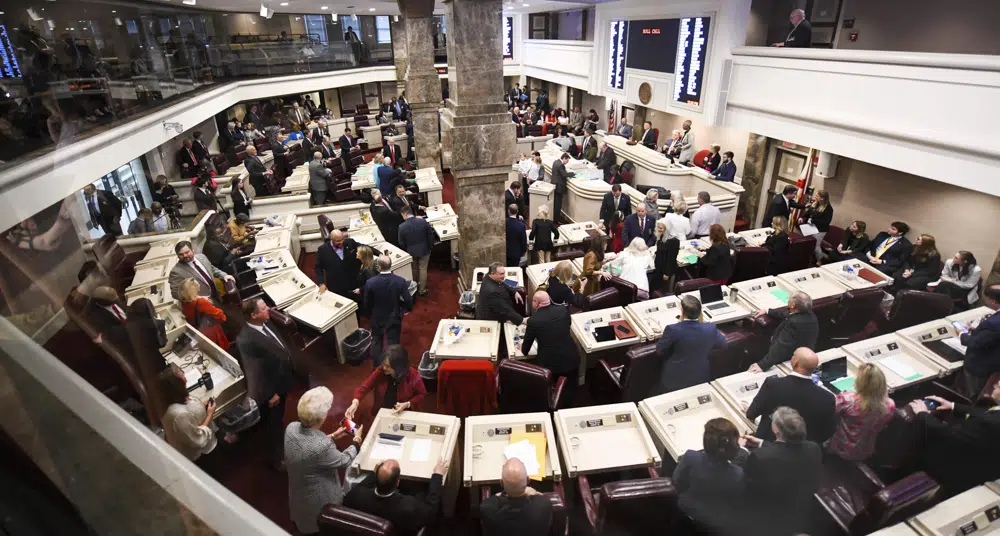
The Alabama House of Representatives passed legislation on Tuesday allowing retired state and local government workers to come out of retirement and return to work for the state or a local government agency, making as much as $52,000 per year while still drawing their state retirement. House Bill 41 (HB41) is sponsored by State Rep. Rex Reynolds. Reynolds explained that state and local retirees who are collecting their Retirement System of Alabama (RSA) benefits can already do this, but the law allowing them to do so capped their compensation at just $30,000. That has risen over time to $37,000. This legislation would raise the amount of money they can be offered to $52,000. “This does not mean that they have to make all of that,” Reynolds explained. “This would apply to law enforcement, corrections, educators, everybody,” Reynolds said. Reynolds acknowledged that there is opposition to this bill. “They want to hire new employees,” Reynolds said. “I am for that too, but the workforce won’t allow that.” Opponents object to a worker retiring, drawing his RSA retirement benefits, and then going back to the state to draw a second check from the state treasury. “They can already do that just by crossing a state line,” Reynolds said. “They are already trained.” Reynolds said that all state agencies are having difficulties recruiting workers in this labor force. HB41 passed the Alabama House of Representatives by a vote of 104 to 0. Reynolds is the retired Huntsville police chief. He chairs the powerful House Rules Committee. The legislation now goes to the Senate, where the bill failed to advance last year. Sen. Sam Givhan has introduced a Senate companion bill. That bill was halted in committee when both budget Chairs, Sen. Arthur Orr and Greg Albritton, blocked the bill from coming out of the Senate Finance and Taxation Committee. They expressed concerns that this could encourage more employees to take retirement, which could cause stress to the state retirement fund and future budgetary complications. Tuesday was the fifth legislative day of the 2023 Alabama Regular Legislative Session. The Alabama Constitution limits the length of a legislative session to no more than thirty legislative days. The unemployment rate is just 2.5%, but Alabama has very low labor force participation. To connect with the author of this story or to comment, emailbrandonmreporter@gmal.com.
Lawmakers say prison plan will continue despite cost jump

Alabama legislative leaders said Thursday they will proceed with plans to build two super-size prisons, despite the cost estimate for the first one mushrooming to nearly $1 billion. The Alabama Corrections Institution Finance Authority on Wednesday increased the spending cap for the 4,000-bed prison in Elmore County, from $623 million to $975 million. Alabama Finance Director Bill Poole said the change was needed after inflation and design alterations caused the projected cost to rise. “I wish it wasn’t there, but as all of you know, inflation has hit us pretty hard over the last few months, and that’s certainly a reflection of that,” House Speaker Nathaniel Ledbetter told reporters. Asked if the state will be able to build both prisons, Ledbetter said he thinks the state will go forward with the plan. “I mean, there might be some adjustments along the way, but as all of you know, we’ve got to do something,” Ledbetter said in reference to the state’s ongoing prison crisis. Republican Rep. Rex Reynolds, the chairman of the House general fund committee, said he had been warned recently that the increase would be needed. “That’s tough. We didn’t see that coming when we first voted on the bond money,” Reynolds said. Still, the move drew criticism from some Democrats. “Actual prison construction hasn’t even started yet, but we are already up to a billion dollars. We haven’t even started talking about paying for the second prison yet. Add this to the billion dollars we are spending on a prison healthcare contract. This is not sustainable,” Democratic Rep. Chris England wrote in a tweet. Alabama lawmakers in 2021 approved a $1.3 billion prison construction plan that tapped $400 million from the state’s share of federal pandemic relief dollars to help build two super-size prisons, including the one in Elmore County and a second one in Escambia County. The U.S. Department of Justice has an ongoing lawsuit against Alabama, accusing the state of violating the constitutional rights of male prisoners in a system “riddled with prisoner-on-prisoner and guard-on-prisoner violence.” The Justice Department noted in an earlier report that dilapidated facilities were a contributing factor to the unconstitutional conditions but wrote, “new facilities alone will not resolve” the matter because of problems with management deficiencies, corruption, violence, and other issues. Republished with the permission of The Associated Press.
Legislature finishes the ARPA special session

On Thursday, the Alabama Senate voted to pass House Bill 1 (HB1), which appropriates $1,060,000,000 in federal American Rescue Plan Act (ARPA) funds for water projects, broadband, healthcare, and other projects. Following Senate passage, the Alabama House of Representatives voted to concur with the changes made by the Senate, and the bill has been sent to the governor. HB1 was sponsored by State Representative Rex Reynolds and was carried by Sen. Greg Albritton. The state has received approximately $2.1 billion in ARPA funding from the federal government. Half of that money has already been appropriated by the Legislative and is in the process of being allocated by the executive branch to projects across Alabama. This second tranche of ARPA money includes about $339,175,000 that will go for healthcare needs, including $25 million for Mental health and $9 million for the expansion of telemedicine. $260 million will be used for broadband, including a cybersecurity component. $395 million will go to water and sewer projects. $55 million will be used to compensate state agencies for the negative impacts of the COVID-19 pandemic. $1,179,000 will go for administrative costs of overseeing and allocating the money. State Sen. Arthur Orr said, “I don’t see what a lot of this has to do with COVID, but I can also see when a train is coming. “We have also got $55 million that can be for food assistance for food banks and nutritional programs,” Orr said. “I appreciate all your hard work on both of these ARPA bills,” Orr said to Albritton. “I think if we never have another ARPA, you would be happy with that.” “It does not fully fund the PEEHIP assistance, which is why the fed passed the original assistance bill,” Orr said. The full Senate voted to adopt the committee amendment introduced Wednesday for Sen. Chris Elliott. Sen. Linda Coleman-Madison offered a floor amendment to the bill. Coleman Madison said, “I would like to know why in-kind contributions was left out. It saves money from contracting out. It saves time. It helps the money go further.” “All of these moneys are under very strict guidelines by the federal Treasury Department,” Albritton said. “If we allow an in-kind contribution that opens up a means of reporting that may become problematic,” Albritton said, “We are talking about the $395 million for water and sewer projects. That is less than 40% of the total ARPA money.” “I ask that you withdraw the amendment,” Albritton said. Coleman Madison said, “I do not want to do anything where the federal government will come back and require a clawback. They want money and not any kind of service. I would like to withdraw my amendment.” Albritton provided a breakdown of the water and sewer dollars in the bill as amended by Elliott’s committee amendment. · $195 million is for water and sewer. · 100 million is water, sewer, and stormwater and may have, but does not require a match. · $100 million in water, sewer, and stormwater and does require a match “Every county in the state will have an opportunity to apply and will actually get funding for a project in their county,” Albritton told the members. “Counties across this state got $495 million directly to counties, and some of them chose to do nothing about stormwater with it,” Senate Minority Leader Bobby Singleton said. “Now they come to us and want us to fix it for them.” State Sen. Rodger Smitherman proposed an amendment to require ADEM to work with a town or county whose application was denied due to an error on the application. “This is simply to help our small towns,” Smitherman said. “If you are in a metropolitan area, you probably have someone who can do this, but our small towns cannot afford that.” “It has already been done,” Albritton objected. “That was in ARPA one. I hesitate to put that language which is already occurring in statute. I am going to vote no on this. We have already added one amendment. I don’t want another amendment one. It raises the possibility of nonconcurrence.” Smitherman’s amendment passed over Albritton’s objection 29 to 1. State Sen. Will Barfoot applauded the members for providing funding for healthcare but urged the members to do more for rural healthcare in the regular session. “I am challenging each of you here to start looking at bills to address healthcare in our rural communities,” Barfoot said. Senate Pro Tem Greg Reed said, “We have to stay focused on rural healthcare.” “We are going to have several pieces of legislation addressing nursing,” Reed said. “A lot of areas in my district, we would not have healthcare if we did not have nurse practitioners.” Reed said that broadband expansion is part of healthcare because of telemedicine. “The technology is advancing tremendously,” Reed said. “That is one way that local hospitals will be able to stay in business. We need to find ways to increase healthcare benefits, particularly in rural places like in my district.” State Sen. Vivian Figures said to Albritton, “Thank you for making sure that the cities and counties that can’t afford to put up a 35% match will be able to do these projects as well.” “I want to thank you for all the work that you have done,” Singleton said to Albritton. “It is a lot of money to spend. We have a lot of needs, but we are beginning to see a difference in the state. We are not going to be able to get it all, but we are knocking a dent in it.” “I wish you could have set aside more of the money for rural hospitals like we did in the first round,” Singleton said. “When that $40 million was cut out for them in the last round, they were ecstatic.” Reynolds asked that the House concur with the Senate changes to HB1. “The second amendment requires that ADEM has to work with a system if an application is denied because of an error,” Reynolds explained. “That system has to have an opportunity to correct that error, and if that application is denied, it has to be
House Committee approves bill to pay off debt to Alabama Trust Fund
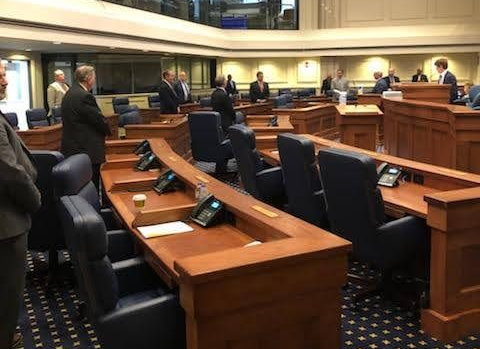
On Wednesday, the Alabama Housed Ways and Means General Fund Committee advanced Senate legislation, SB1, to pay off the final balance on a debt that the Legislature borrowed from the Alabama Trust Fund. Senate Bill 1 is chaired by State Sen. Greg Albritton. State Representative Rex Reynolds chairs the committee. “I expect this to go quick as this committee passed the same legislation as a House Bill last week and passed on the House floor,” Reynolds said. “Since I am carrying the bill, I will turn over this to my Co-Chair, Rep. [Kyle] South.” Rep. Kyle South asked that the bill be brought up. Reynolds said, “SB1 is the exact same bill as HB2. It appropriates $59,975,672 to pay off the balance owed to the Alabama Trust Fund. It is what we committed to under the People’s Trust Act.” The bill received a favorable report, and the committee adjourned. The full House can consider SB1 as early as Thursday. The Senate passed SB1 on Tuesday. The House also passed its trust fund debt bill, HB2, on Tuesday. The Alabama Trust Fund is funded by revenues from the state’s oil and gas leases. It serves as the state’s savings account. A portion (69%) of the investment revenue from the Alabama Trust Fund is used to fund the state general fund (SGF). The remainder of the ATF revenues also funds cities, counties, Forever Wild, and senior services. State SGF revenues dropped from approximately $2.1 billion a year during the Great Recession to $1.6 billion. Once all the reserve fund and federal emergency bailout funds were exhausted, and budget cuts were made, state Legislators were left with the difficult decision. They could release thousands of state prisoners and/or cut benefits for hundreds of thousands of Alabamians who get their healthcare from Alabama Medicaid (which would have resulted in a federal lawsuit). Alabama Medicaid and the Alabama Department of Corrections are the two largest agencies funded by the SGF. Voters in 2014 approved a plan by legislators to raid the $3.2 billion Alabama Trust Fund to avoid devastating general fund cuts The ATF balance was $2,430,232,27 in 2015. As of September 30, 2022, the balance declined by $767 million due to investment downturns to $3.1 billion. The ATF distributed $197.4 million in FY2022. The Senate Finance and Taxation General Fund Committee, chaired by Albritton, met on Wednesday and gave a favorable report to the American Rescue Plan Act appropriations bill, HB1, which appropriates $1,060,000,000 in one-time federal dollars given to the state by Congress. The committee did not take up HB2, so at this point, it appears that SB1 will be the trust fund repayment bill that is best positioned for passage. The full House can now consider the legislation as early as Thursday. The Alabama Legislature is currently in its First Special Session. It is hoped that the body will be able to resume the 2023 Alabama Regular Session on Tuesday, March 21. To connect with the author of this story or to comment, email brandonmreporter@gmail.com.
Alabama Senate Committee amends ARPA funding bill
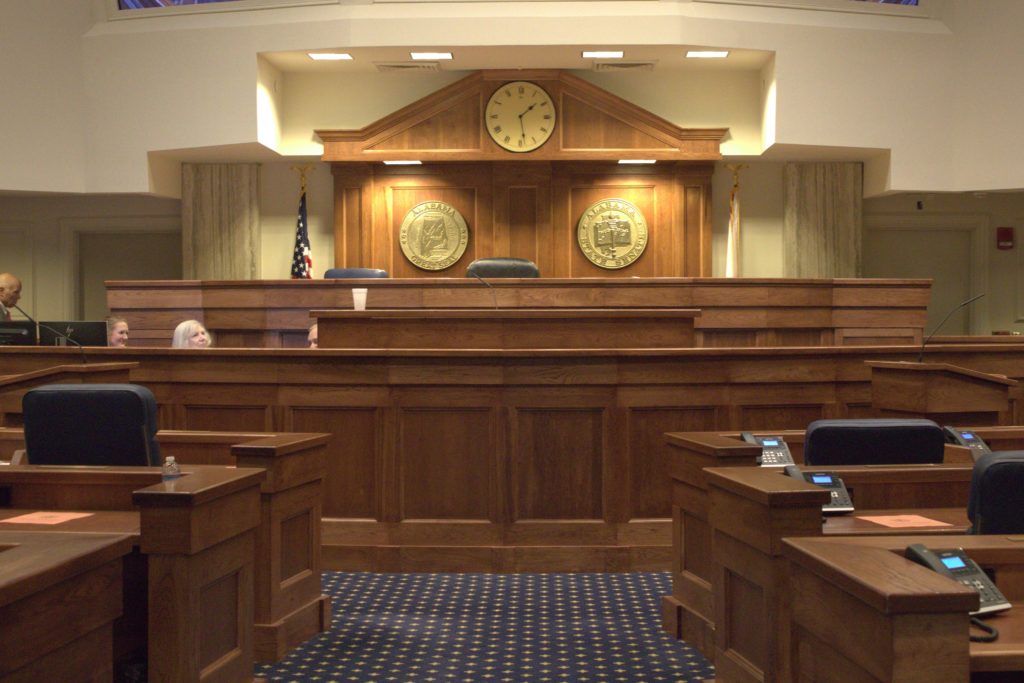
The Alabama Senate Finance and Taxation General Fund Committee met on Wednesday morning to consider the American Rescue Plan Act appropriation bill passed by the House on Tuesday. The Committee voted to give the legislation a favorable report but only after amending how the sewer and water funds are distributed. House Bill 1 (HB1) is sponsored by State Rep. Rex Reynolds, who chairs the House Ways and Means General Fund Committee. The legislation appropriates the second $1,060,000,000 that the state received from the federal government through the controversial ARPA Act – all of which are paid for through federal deficit spending. State Sen. Greg Albritton chairs the Senate Finance and Taxation General Fund Committee. Albritton shared two documents with the members of the Committee. The first was an email from the Alabama Department of Environmental Management (ADEM) outlining where the first round of ARPA money for water and sewer projects has been allocated. “This data is also available online,” Chairman Albritton said. “The second is the MOA (Memorandum of Understanding) between the Department of Finance and ADEM on the distribution of that money.” “HB1 is the ARPA document,” Albritton said. “It passed the House 101 to 3.” Sen. Chris Elliott presented an amendment to HB1. Elliott explained that his amendment further defines the use of the water and sewer projects portion of the ARPA funds to include stormwater projects. The amendment also sets aside up to $100 million for the water and sewer projects to require matching grants of up to 35% and includes changes to the formula to factor in for growing communities. “It allows this money to be used for stormwater infrastructure,” Elliott explained. “It further stretches this money out by requiring matching grants from local communities.” $395 million of the ARPA will go to water and sewer projects. ADEM will award the projects to water and sewer systems that apply for the funds. State Sen. Linda Coleman Madison said, “I had an amendment to add, but your amendment includes that. What is the difference between the two amendments?” Albritton said, “It includes that and goes further to delineate that a portion of the money requires a 35% match.” The Elliott amendment was adopted by a 15 to 0 vote. “I know Sen Coleman Madison calls me Senator No,” said Sen. Sam Givhan. “It’s better, but it’s still not there yet.” HB received final passage by the Committee, with 12 members voting in favor and three members, including Givan, voting to abstain. The full Senate can now consider the legislation as early as Thursday. If the legislation passes the Senate with the Elliott amendment, it would have to go back to the Alabama House of Representatives for them to consider the changes. The Alabama Legislature is currently in its First Special Session. It is hoped that the body will be able to resume the 2023 Alabama Regular Session on Tuesday, March 21. To connect with the author of this story or to comment, email brandonmreporter@gmail.com.
Alabama Senate passes legislation to pay off debt to Alabama Trust Fund
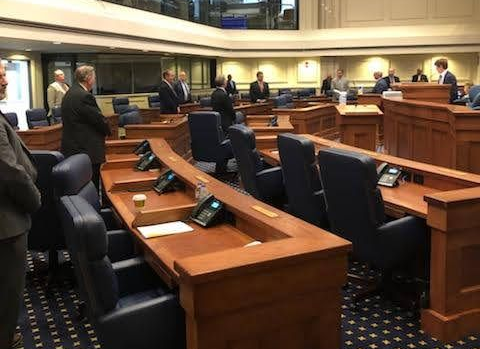
On Tuesday, the Alabama Senate passed legislation that would authorize a supplemental appropriation to pay off the remaining balance the state owes to the Alabama Trust Fund, which was raided almost a decade ago by the Legislature to make up for what was then a significant shortfall in the State General Fund (SGF). Senate Bill 1 (SB1) is sponsored by State Senator Greg Albritton. Albritton is the Chairman of the Senate Finance and Taxation Committee. “This is not even one page,” Albritton said. “This is one paragraph, as we are paying off the Alabama Trust fund.” Sen. Clyde Chambliss said, “I grew up in Prattville. My father taught me that you take care of your debts. You pay off your debts and try not to accumulate debts. Sometimes though, you need a helping hand, and we had that situation during the Great Recession.” “This is part of the historical process to pay off that debt,” Albritton said. “Fortunately, we owe it to ourselves. Thanks to the people that went before us and set up the trust fund. Then we were $250 million in the hole and trying to find money.” “I didn’t want us to gloss over and pass this without pointing out what we have achieved,” Chambliss said. “Frankly, there were ways we could have gotten around this and not pay this.” Albritton said, “It was thought about.” Sen. Rodger Smitherman said, “I am with you 100% for what you are trying to do with this bill.” “We got all this money in the general fund,” said Smitherman. “We got plenty of money. It is about time for us to come up with 10 or 12 million to fund all of our needs for judges. We have got a real-life need for the state of Alabama.” Smitherman said that the judges would pay for themselves by completing the backlog of cases and generating court costs and fines. “We are going to make four times that off the court system if we have the judges in place to hear those cases,” Smitherman said. “I am with you 100% on paying the money back.” “I look forward to all of us seriously addressing that to try to solve the needs problem that exists in all of our circuits,” Smitherman said. “I look forward to voting with you on this bill.” The funds to pay off the debts will be paid with a supplemental appropriation from surplus funds from the 2022 fiscal year that ended on September 30. SB1 passes the Senate by a vote of 33 to 0. The Alabama House passed similar legislation earlier in the day. House Bill 2 (HB2) is sponsored by State Representative Rex Reynolds, who chairs the powerful House Ways and Means General Fund Committee. The bill appropriates $59,997,772 to pay off the remaining debt owed to the Alabama Trust Fund. “This is a good bill. This body knew that this was the time to pay those bills,” Reynolds said. The House passed HB2 104 to 0. Ninety-four members cosponsored the bill. HB2 passed the House 103 to 0. The Senate Finance and Taxation General Fund Committee will meet at 9:00 a.m. to consider an appropriations bill, HB1, to appropriate $1,060,000,000 of American Rescue Plan Act funds. The full State Senate will meet at 1:00 p.m. The Legislature is currently in a special session called by Alabama Governor Kay Ivey to deal with appropriating the ARPA funds. To connect with the author of this story or to comment, email brandonmreporter@gmail.com.
House passes ARPA funding legislation

On Tuesday, the Alabama House of Representatives passed the American Rescue Plan Act (ARPA) appropriations legislation – House Bill 1. The legislation, House Bill 1, is sponsored by State Rep. Rex Reynolds, who chairs the powerful House Ways and Means General Fund Committee. Reynolds explained that the state had received approximately $2.1 billion in ARPA funding from the federal government. Half of that money has already been appropriated by the Legislative and is in the process of being allocated by the executive branch to projects across Alabama. This tranche of ARPA money is about $1,060,000. $339,175,000 will go for healthcare needs, including $25 million for Mental health and $9 million for the expansion of telemedicine. $260 million will be used for broadband, including a cybersecurity component. $395 million will go to water and sewer projects. $55 million will be used to compensate state agencies for the negative impacts of the COVID-19 pandemic. The Alabama Department of Labor will get $5 million to recover some of their costs for dealing with the surge in unemployment applications and other costs. $1,179,000 will go for administrative costs of overseeing and allocating the money. Rep. Mary Moore asked if there was sufficient legislative oversight in place. Reynolds said, “The Legislative Oversight Committee gives this body oversight in case they may need to reallocate those funds when the Legislature is not in session.” “There might be a project in my district that is not reallocated,” Moore said. House Minority Leader Anthony Daniels said to Reynolds, “I just came down to give you a compliment, and I appreciate all the hard work you have done in this bill. This has been a great process, and everybody has had an opportunity to be involved in this process.” State Rep. John Rogers expressed concern that a project in his district might be reallocated when he is unavailable. “I may be in Alaska – I may be in Florida laying on a beach drinking a martini,” Rogers said. Reynolds replied, “As part of the ARPA funds when the ARPA funds were allocated, that legislation created that Oversight Committee for the ARPA funds. I think you can feel comfortable in the authority given to that committee.” Reynolds explained, “Executive Budget Office would have to come back in and exercise the executive authority they have under that bill,” if insufficient funds are allocated to a project. “You can go to their website and see the progress of individual projects.” “Huntsville is like Birmingham – they got money coming in that we don’t know about,” Rogers said. “What I want to know is how much they really got that didn’t come through us?” Reynolds said the Oversight Committee “is a 14-member body including budget chairs. It is spelled out in the 2022 legislation that we passed last year.” State Rep. Juandalynn Givan asked, “Could you give me a breakdown of how much is coming to Jefferson County?” “No, I do not have access to that,” Reynolds said. “This legislation we are asking you to pass does not break that down by county.” 63 of the 67 counties have received money already, but four have not. “We have language in this bill that says that those applications should have priority,” Reynolds said. “We would not want to preset that based on county, because you want to prioritize that by need, and one county would not have the same need as another need.” Givan replied, “My folks don’t really care how much went to this or that county. What they want to know is how much of the bacon is coming back to the district. We need to be able to report that back to our people.” Reynolds replied, “The money will not be allocated until after we pass this bill.” Givan said, “I was here in another session, and we appropriated over a billion dollars, including ARPA dollars, for prisons that still are not built yet.” Givan was angry that no ARPA money was appropriated to bail out Birmingham Southern College – a private college in financial distress. “We can’t figure out how to find $37 million for ARPA money for an educational institution, but we could find money to build prisons. Lord knows we don’t need to lose another educational institution in the state of Alabama,” Givan said. Givan complained that public housing communities in Alabama, even in urban areas, still do not have broadband. HB1 passed the House 102 to 3. 71 members cosponsored the resolution. Reynolds was also the sponsor of House Bill 2. This bill appropriates money from supplemental 2022 funds to spend $59,997,772 to pay off the remaining debt owed to the Alabama Trust Fund during the previous decade. “This is a good bill. This body knew that this was the time to pay those bills,” Reynolds said. The House passed HB2 104 to 0. 94 members cosponsored HB2. Both bills now go to the Alabama Senate for their consideration. Speaker of the House Nathaniel Ledbetter told the members before the House adjourned, “Good work today, a great investment in our state. Congratulations.” The Legislature is currently in a special session called by Alabama Governor Kay Ivey last week to address the issue of the ARPA funds. To connect with the author of this story or to comment, email brandonmreporter@gmail.com.
Lawmakers advance plan for American Rescue Plan funds

Alabama lawmakers on Thursday advanced a spending plan to use the state’s final $1 billion in federal pandemic relief funds on water and sewer infrastructure, broadband expansion, health care reimbursements and other projects. The House Ways and Means General Fund Committee approved the legislation with one dissenting vote. It now moves to the full House of Representatives, where lawmakers plan to vote on it Tuesday. The sponsor of the bill, Republican Rep. Rex Reynolds of Huntsville, said he has multiple meetings with House members about the plan and is hoping for broad support during next week’s vote. “We need to get this passed and get it up to the Senate, and we’ll address any amendments that come up,” Reynolds said. Republican Rep. Arnold Mooney voted against the bill after saying he had some unanswered questions, including if lawmakers will have adequate oversight of the spending. Mooney said the Alabama Legislature is “constitutionally given the responsibility to appropriate funds and make sure that those funds are used in a correct manner.” The spending plan directs pots of money to state agencies, such as the Alabama Department of Environmental Management, and other entities to distribute for the allotted purposes. Reynolds said that lawmakers voted to create the Joint Legislative Oversight Committee on American Rescue Plan Act State Funds, which can request reports on expenditures. Alabama Gov. Kay Ivey called lawmakers into special session this week to address how to use the state’s remaining $1.06 billion from the American Rescue Plan Act — the sweeping $1.9 trillion relief plan approved by Congress to help the country climb out of the coronavirus crisis. The proposed spending plan would allocate: — $339 million for healthcare costs, including $100 million to reimburse hospitals for pandemic-related expenses, $100 million to reimburse nursing homes, and $25 million to support mental health programs and services. — $400 million for water and sewer infrastructure projects, including $195 million for high-need projects, $200 million for matching funds for public water and sewer systems, and $5 million for septic systems in the Black Belt region. — $260 million for improvement and expansion of broadband network access. — $55 million for projects that address economic impacts of the pandemic. The legislation says the Department of Finance may distribute the money for a wide range of needs, such as food banks, long-term housing, and summer learning programs for children. House and Senate committees on Thursday also advanced separate legislation to use $60 million from the current budget surplus to finish repaying money borrowed a decade ago during a budget shortfall. Alabama voters in 2012 approved borrowing $437 million from the Trust Fund — a state savings account fueled by offshore drilling royalties — to avoid cuts to state services. Republished with the permission of The Associated Press.
Steve Flowers: Legislature organizes for Quadrennium

The legislature had their every four-year organizational session earlier this month. It is exactly what the title states. They are organizing for the next quadrennium of lawmaking. They officially chose their leadership and adopted the rules for the two chambers. The 105-member House of Representatives and 35-member State Senate are elected for four-year terms, the same as the governor and other constitutional offices. However, unlike the governor, who was sworn in on Monday, January 16, as set out in the state constitution, the legislature takes office the day after they are elected in November. The state House of Representatives will have 77 Republicans and 28 Democrats. That is a veto-proof, bulldozer-shoving, anything-you-want supermajority. The Democrats have very little say with those overwhelming numbers. Two days after they were elected in November, the 77-member Republican majority met in a private caucus meeting in Montgomery and selected their leadership. Therefore, the vote for Speaker of the House two weeks ago was simply a formality. The House has chosen Representative Nathaniel Ledbetter to be the Speaker of the House. Speaker Ledbetter hails from Rainsville in DeKalb County. He is a former Mayor of Rainsville. He has only been in the House of Representatives for eight years, having been first elected in 2014. He was chosen to be the majority leader in the House in his freshman year. He was close to the former Speaker Mac McCutcheon, and he served on both the powerful agenda-setting Rules Committee, as well as the Ways and Means Education Budget Writing Committee. Representative Chris Pringle of Mobile has been chosen to be Speaker Pro Tem of the House, which is the second highest position within the body. He has served previously for 16 years in the House from the Port City. He succeeds fellow Mobilian Victor Gaston in this post. There are two young stalwarts who will be serving in Republican Party positions within the House. Representative Scott Stadthagen of Decatur will be the new House Majority Leader. Representative Wes Kitchens of Arab will serve as the Republican Leadership Caucus Vice Chair. Representative Debbie Wood from the Valley will serve as the Republican Caucus Secretary/Treasurer. The three most powerful posts in the House are the chairmanships of the two money committees and the agenda-setting Rules Committee. Representative Danny Garrett of Trussville in Jefferson County will continue to Chair the Ways and Means Education Budget Committee. Representative Rex Reynolds of Huntsville will be the General Fund Ways and Means Chairman. Reynolds replaces longtime Ways and Means Chairman Steve Clouse of Ozark. Representative Joe Lovvorn of Auburn will be the new Rules Committee Chairman. Representative Jim Hill of St. Clair will chair Judiciary. He is a former circuit Judge and a veteran of the House. All of these House leadership positions are held by Republicans. To the victor goes the spoils. The Democrats have a veteran and sterling team heading their Caucus Leadership in the House. Anthony Daniels of Huntsville will be the Democratic Minority Leader. Barbara Drummond of Mobile will be the Caucus Chair. Mary Moore of Birmingham will be the Vice Chair, and Kelvin Lawrence of Hayneville will be Secretary/Treasurer of the Democratic Caucus. The 35-member Alabama State Senate returns almost intact with their continuity and quality leadership. They will dominate and provide a stable State of Ship to help lead the state. Republicans control this upper chamber to the same degree that the GOP members do in the House. Republicans outnumber Democrats 28 to 7 in the Senate. State Senator Jabo Waggoner of Jefferson County begins his 50th year in the legislature. This is a state record. He is definitely destined for the state history books. Jabo will continue to Chair the powerful Rules Committee. Greg Reed of Walker County will be Pro Tem of the Senate again. The Majority Leader will again be Clay Scofield of Marshall County. The two money committee chairmen will continue to be in charge of how the state revenues are spent. Senator Arthur Orr of Decatur will chair Finance and Taxation/Education. Senator Greg Albritton of Escambia will chair Finance and Taxation/General Fund. These two men will be very powerful. Popular state Senator Will Barfoot of Pike Road will chair Judiciary in the Senate. Senator Clyde Chambliss of Prattville has become a stalwart leader in the Senate. He will be Majority Whip. Lieutenant Governor Will Ainsworth presides over the Senate. The Regular Session begins in early March. See you next week. Steve Flowers is Alabama’s leading political columnist. His weekly column appears in over 60 Alabama newspapers. He served 16 years in the state legislature. Steve may be reached at www.steveflowers.us.
Kay Ivey meets with legislative budget chairs
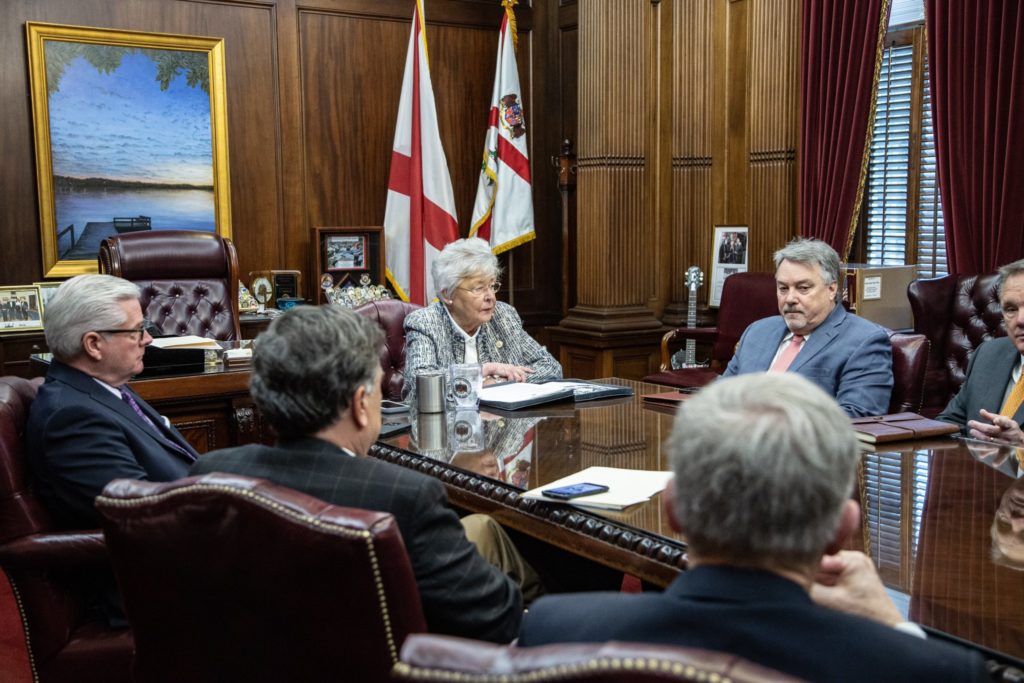
Gov. Kay Ivey met with legislative leaders on Wednesday to discuss the 2024 budgets and potential 2023 supplemental appropriations. “Today, we had our first meeting of the new term with our legislative budget chairs,” said Gov. Ivey. “How we budget will affect Alabamians for decades to come, and this group of leaders is committed to ensuring we will continue taking a fiscally conservative approach to our budgets.” Republicans have commanding control of Alabama state government, so all of the legislative leaders at Wednesday’s meeting were members of the GOP. They include new Speaker of the House Nathaniel Ledbetter, new Chairman of the House Ways and Means General Fund Committee Rex Reynolds, Chairman of the House Ways and Means Education Committee Danny Garrett, Ivey’s Director of Legislative Affairs Drew Harrell, State Finance Director Bill Poole, State Senate Finance and Taxation General Fund Committee Chairman Greg Albritton, State Finance and Taxation Education Committee Chairman Arthur Orr, and Senate Pro Tem. Greg Reed. Legislative Service Agency Fiscal Division Director Kirk Fulford, the Pro Tem.’s chief of staff Derek Trotter, and other staff members were also present. “Yesterday the Leadership of the House and Senate, and the Budget Chairman’s met with Governor Ivey, Director Poole and staff,” Reynolds said on social media. “The Governor engaged the meeting with direct questions related to our economy, our workforce, and the services the state provides to Alabamians.” The big-budget question hanging over the coming legislative session is what to do with the budget surplus. The state had over a billion dollar surplus left over from fiscal year 2022, which ended on September 30 that rolled into fiscal year 2022. Alabama has an arcane budgeting system where education goes into one budget – the education trust fund budget (ETF) for education spending and the state general fund (SGF) for non-education-related expenditures. Last year, the ETF for FY2023 passed by the Legislature was $8.26 billion – $589 million more than FY2022. The SGF for FY2023 passed was $2.74 billion – $53 million more than FY2022. Both are all-time records. The state’s reserve funds are already flush with funds from four straight years of conservative budgeting. With wages rising and the number of workers employed at an all-time high, the state is likely to take in more than the $11 billion the Legislature expected in FY2023 – the current budget year. The Legislature has some hard choices to make when the 2023 regular legislative session begins on March 7. They likely will have significant surplus funds left over for supplemental appropriations in FY2023 – they had over a billion dollars in supplementals in FY2022. Leaders could increase state spending, rebate surplus dollars to the taxpayers in one-time checks, or lower taxes in FY2024. Orr said that the Legislature may rebate up to $500 million back to taxpayers later this year. Another major issue facing the budget committees is what to do with all the American Rescue Plan Act (ARPA) money that the state is getting from the federal government – albeit with many federal strings attached. The second $one billion of that money has to be appropriated. The Governor will formally make her FY2024 budget requests on Tuesday, March 7, when she makes her state of the state address to a joint session of the Alabama Legislature at the historic 1859 Alabama Capitol Building. To connect with the author of this story, or to comment, email brandonmreporter@gmail.com.
House leadership comments on massive unemployment tax cuts

Alabama House Republican Caucus Speaker Nominee Nathaniel Ledbetter and House Ways and Means Committee Chairman Danny Garrett said on Friday that a dramatic cut in unemployment insurance taxes announced by the Alabama Department of Labor this week will help keep the state’s historic economy and job market growing even more in the coming months. “Based on the Department of Labor’s announcement, the financial burden that surging unemployment forced upon employers and businesses during the pandemic has come to an end,” Ledbetter said. “And thanks to the legislature’s strategic planning and wise fiscal policies during the pandemic, Alabama has remained open for business, and our economy is currently the strongest in history.” The Labor Department announced Thursday that Alabama employers would experience a 54 percent tax cut on their unemployment insurance taxes during 2023. This tax cut has dropped Alabama into the lowest tax rate schedule, moving the state’s tax rate from Schedule D to Schedule A. After massive layoffs caused by the pandemic depleted the state’s unemployment fund, the state legislature appropriated federal COVID relief funds to replenish the coffers of the depleted trust fund. The issuance of Revive Alabama Grants by Alabama Governor Kay Ivey and actions taken by the Small Business Commission to re-open Alabama businesses faster allowed repayments to the unemployment fund much sooner than in states that stayed shut down longer during the forced economic shutdowns. “The remarkable achievement of moving from the highest to the lowest tax rate category is a direct result of the collaborative efforts over the past several years by Gov. Ivey, Lt. Gov. Will Ainsworth, the Small Business Commission, and both bodies of the legislature,” Garrett said. “These tax cuts will benefit businesses of all sizes and ensure that Alabama’s economy, which is already among the best in the nation, remains strong for the immediate future.” “Following the economic uncertainty and the record-breaking amount of unemployment compensation benefits paid out during the pandemic, it is absolutely remarkable that we have been able to lower taxes for employers and drop to the lowest tax rate schedule in this short amount of time,” said Labor Secretary Fitzgerald Washington. Ledbetter was selected by the House Republican Caucus to replace the retired Rep. Mac McCutcheon as Speaker of the Alabama House of Representatives. Since Republicans have a 77 to 28 supermajority, the Republican choice for Speaker is highly likely to be elected Speaker when the Legislature meets for its organizational session next week. Ledbetter has announced that if he is the Speaker, he will reappoint Garrett as the Chair of the powerful House Ways and Means Education Committee. Ledbetter has also announced that State Rep. Rex Reynolds will chair the House Ways and Means General Fund Committee. Reynolds replaces State Rep. Steve Clouse, who challenged Ledbetter for the Speaker’s chair. To connect with the author of this story, or to comment, email brandonmreporter@gmail.com.
Nathaniel Ledbetter announces planned committee chair appointments

Rainsville Republican Nathaniel Ledbetter is expected to be elected as the next Speaker of the House in the Republican-dominated Alabama House of Representatives. On Wednesday, Ledbetter announced his first picks for Committee chairs. The Alabama House Republican Caucus has already chosen Ledbetter as their Speaker-designate but can’t formally elect a Speaker until the full House gavels in for an organizational session in January. Since Republicans occupy 77 of the 105 seats in the Alabama House of Representatives, it is a foregone conclusion that the party’s pick will be the next Speaker. Under the rules of the Alabama House of Representatives, the Speaker picks the committee chairs – normally from his or her own party. “I am confident that each of these members will serve our state well and invite new ideas and fresh perspectives to the committees they chair,” Ledbetter said in a statement. “All of them possess unique skills, talents, experiences, and abilities that make them uniquely qualified to chair the committees they will be assigned to lead.” The powerful House Rules Committee sets the proposed special order calendar for legislation that the body is to consider. Chairman Mike Jones did not return to the legislature. Ledbetter has chosen Rep. Joe Lovvorn to chair the Rules Committee. He is a retired firefighter and currently works as a realtor and small business owner. Lovvorn previously served as chair of the House Technology and Research Committee, which means that Ledbetter will be appointing a new chair for that committee as well. State Rep. Rex Reynolds will be the new Chairman of the House Ways and Means General Fund Committee. Former Chairman Steve Clouse has returned to the House, but he challenged Ledbetter for the open Speaker position when outgoing Speaker of the House Mac McCutcheon announced his retirement. Reynolds is retired law enforcement. He is the former Police Chief of Huntsville. State Rep. Danny Garrett will be returning as the House Ways and Means Education Budget Committee Chairman. Garret is a former CFO of two different publicly traded manufacturing companies and is a former Trussville Board of Education member. State Rep. Jim Hill will be returning as Chairman of the powerful House Judiciary Committee. Hill is a retired St. Clair County Judge. He works for the Moody-based law firm Hill, Gossett, Kemp & Hufford. Committee Chairs are very powerful because they set the agendas for what bills will and will not be considered in their committees and when. In the case of the Education and General Fund budget committees, the chairs have enormous influence over the budgets that pass out of their committees. Rep. Chris Pringle has been chosen by the House Republican Caucus as their designee to fill the role of Speaker Pro Tem, replacing Rep. Victor Gaston, who also did not seek re-election. Scott Stadthagen is replacing Ledbetter as House Majority Leader. The House Democratic Caucus has already elected Rep. Anthony Daniels to return as House Minority Leader. To connect with the author of this story, or to comment, email brandonmreporter@gmail.com.

